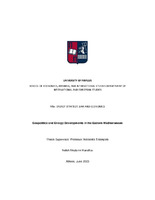| dc.description.abstractEN | The Eastern Mediterranean is and always has been a region steeped in rich geopolitical history. In the recent years its significance and status have augmented enough that it is now considered a highly important regional theater. Combining Europe and the EU with North Africa and the Middle East, its location alone is enough to consider it a major hub for trade and economic development. The recent discoveries of hydrocarbon reserves have only added to the area’s importance, not just for the neighbouring regions and the countries located in it, but potentially at an international level.
At a time of deep energy crisis that impacts the entire globe, the diversification of energy sources has become even more imminent, giving the Eastern Mediterranean countries the opportunity to take advantage of their newfound resources and potentially rise economically and politically, especially in the regional level and secondly at a global one.
Nevertheless, the Eastern Mediterranean region consists of countries with different backgrounds, culture, history, varying stages of economic development and it also comes with many conflicts between neighbouring states.
For the region to achieve a higher status and manage to rise and become a major regional energy player, both for exporting and for transporting energy resources such as natural gas, a certain level of collaboration is needed. For this to materialize, not only do the countries of the area need to all be at the same table of negotiations, but major international players, such as the European Union, need to be involved as well in order to ensure that the common interests are being promoted and the regional conflicts are being pushed aside in the name of progress and economic prosperity.
Even though the new discoveries of energy resources are of pivotal importance to the area and its progress, energy on its own could not be enough to promote prosperity and stability in the region, however, it has proven to be a good starting point for closer collaboration between the regional actors and for the promotion of new initiatives, infrastructure projects. With such a volatile state in terms of geopolitical developments in the region and globally , time will tell how the countries of the Eastern Mediterranean will handle the changes and whether they will opt for closer collaboration or further conflict. | el |


